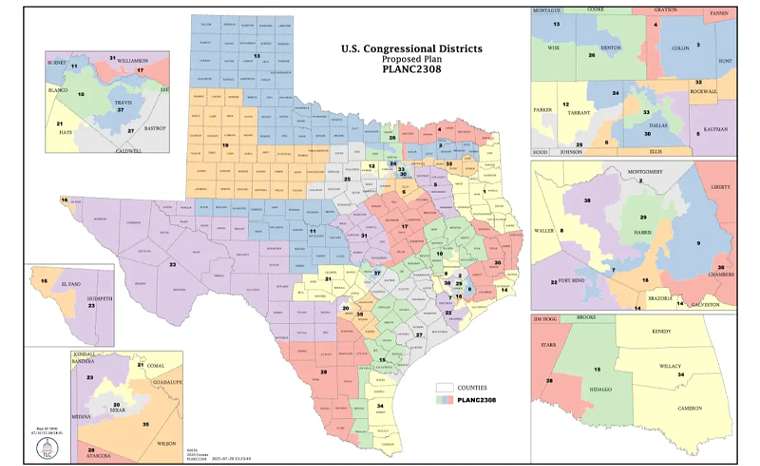GOP Redistricting Map Passes Texas House
The Texas House on Wednesday approved a new redistricting map designed to pick up five additional GOP Congressional seats over vocal opposition and last-minute stall tactics from the minority Democratic party, representing a significant hurdle before Gov. Greg Abbott signs it into law.
The measure passed 88-52. Texas Democrats say the effort is unnecessary, illegal, and racist. After a two-week quorum break where more than 50 lawmakers fled the state to avoid voting on the redistricting bill, they returned to the Capitol on Monday, prepared to vote against the map and vowing to challenge it in court.
Rep. Todd Hunter, R-Corpus Christi, who authored House Bill 4, said the districts were drawn “primarily on the basis of political performance.”
“This plan includes political considerations, public testimony, recognition of population growth, and recent changes in voter trends,” Hunter said. “Thirty-seven of the 38 congressional districts have changed to some degree. The primary changes are focused on only five districts for partisan purposes.”
“Four of the five new districts are majority-minority Hispanic,” he added. “Each of these newly-drawn districts now trend Republican in political performance. While there’s no guarantee in electorate success, Republicans will now have an opportunity to potentially win these districts.”
The Texas House of Representatives approved new congressional districts on Wednesday, with Democrats vowing to challenge the map in court.
Texas Legislative Council
More than two dozen Democrats spoke against the map during a lengthy floor debate that began at 10 a.m. and ended around 5:30 p.m., saying they wanted to establish a record that could be used in a legal challenge. Some encouraged their Republican colleagues to save their emails and text messages because the courts would be coming for them.
“We should have been debating a bill to restore flood relief to many Texans who lost their lives in the Kerr County historic flooding, but instead the first bill that we’re taking up is a racially gerrymandered House Bill 4, mid-decade redistricting that is totally unnecessary,” said Rep. Ron Reynolds, D-Missouri City.
The legislator was one of many who alleged that the redistricting effort involves “packing and cracking,” or widening the GOP advantage by unconstitutionally compressing people of color into some districts while spreading them throughout others to reduce their ability to elect who they want to represent them.
Congressional districts that were approved in 2021 based on new Census data, with population growth largely driven by Black and Hispanic voters, were hailed by those who voted for them, including Republicans, as “race blind.” The state’s current congressional districts are currently being challenged in federal court.
“I challenge you, when you look in the mirror, where were you?” Reynolds said. “Were you on the right side of history, in favor of voting rights for all, or were you on the wrong side of history, upholding discrimination with this racially gerrymandered map?”
Rep. Ann Johnson, D-Houston, accused Republicans pushing the redistricting effort of racism.
Screenshot
Rep. Ann Johnson, D-Houston, said the effort is clearly racist.
“Let’s talk about cowardice and cheats,” she said. “If you knew you could win this next election, you wouldn’t be taking this effort to try to steal five seats from elected officials that people of color elected to represent them in Washington, D.C. You shield your racism with your party. You think that people will give you grace on ignorance and arrogance around the party because you can’t admit that the root of all of this is about racism and power.”
The Texas Legislature’s second special session began on August 15 after the conclusion of a 25-day first session in which very little was accomplished because of the quorum break. At least 69 bills were read into the record and referred to committees when the Democrats returned earlier this week, most dealing with emergency management and disaster response related to the July 4 Hill Country floods.
And yet the only item before the House for a vote on Wednesday was redistricting, a point made by many who oppose it.
The second special session has had its share of theatrics. Those who fled the state were assigned DPS surveillance officers to monitor their movement and ensure they returned to the Capitol for floor sessions such as the one held Wednesday. Rep. Nicole Collier, D-Fort Worth, declined to sign a permission slip and spent two nights locked in the Texas House.
Rep. Nicole Collier, D-Fort Worth, questions HB 4 author Todd Hunter, R-Corpus Christi, on Wednesday.
Screenshot
Collier, a seven-term state representative and attorney, was later joined by other Democrats who ripped up their permission slips as a sign of solidarity. The state rep filed a petition earlier this week alleging that restraining her in the House is illegal. Republican lawmakers have criticized Collier’s actions as a “sit-in protest” and publicity stunt that had no effect on the outcome of redistricting maps.
Several Democratic lawmakers wore green on Wednesday in support of Collier, who has been wearing a green blazer since she got locked in the House on Monday morning.
The Texas Legislature’s redistricting fight has drawn national attention and prompted California Gov. Gavin Newsom to propose new maps in his state that would add Democratic seats, countering the effort in Texas to preserve President Donald Trump’s narrow GOP majority in the U.S. Congress.
Several amendments were introduced on Wednesday in attempts to establish an independent redistricting commission, get a federal court opinion on the legality of the map, and ensure that the new Congressional districts would not become effective until after the May 2026 elections.
Rep. Gene Wu, D-Houston, chair of the Democratic Caucus, asked to delay the vote until the Epstein files were released. He was denied and told that his amendment was “not even remotely related” to congressional redistricting.
Democrats also attempted to table redistricting altogether and instead discuss flood bills. They brought up the matter of disaster response by making “parliamentary inquiries” so their statements would be included in the record.
“Why was House Bill 1, the flood relief bill that is the House’s answer to the deadly July 4 flooding that killed over 135 people, not the first order of business of this special session for the Texas House?” asked Rep. Gina Hinojosa, R-Austin. Speaker of the House Dustin Burrows declined to answer, saying that it wasn’t a proper parliamentary inquiry.
Rep. Jon Rosenthal, D-Houston, said an unfair process was employed to “ram this gerrymandered piece of work down the throats of the people of our state.”
“The whole process for this has been a sham from the beginning,” he said. “Any member in here, any leader in this state, who tries to tell you that there were public hearings on this map, that is simply a lie. That is not true.”
“What we have before us today is a committee substitute that was voted out in a formal meeting. They did not hold hearings on this bill. They did not hold hearings on this map.”
Rep. Gene Wu, D-Houston, urged Democrats and officials from other states to stay vigilant in the redistricting fight.
Screenshot
Wu urged Texas Democrats and officials in other states to remain vigilant.
“My fellow Americans, if you want to take your country back, if you want to go back to a nation where education actually provided a pathway to success, where hard work and following the rules actually meant something, where just because you were rich and powerful does not mean you get to evade justice, then start fighting,” he said. “Start here.”
“Texas will have to go to the courts, but California, New York, Illinois, Michigan, and many other states, look at what’s happening here,” he added. “Look carefully. This is the future, right here, if you do not act now.”

Reign Bowers is an outdoor enthusiast, adventure seeker, and storyteller passionate about exploring nature’s wonders. As the creator of SuperheroineLinks.com, Reign shares inspiring stories, practical tips, and expert insights to empower others—especially women—to embrace the great outdoors with confidence.








Post Comment